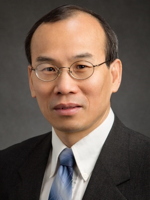Breaking the Spatiotemporal Barriers of MR Spectroscopic Imaging:
A Marriage of Spin Physics and Machine Learning for Label-Free Molecular Imaging
Molecular imaging has been a dream of biomedical imaging scientists for decades, and governments and industries around the world have invested billions into this area. However, most existing molecular imaging techniques (e.g., PET and SPECT) require exogenous molecular probes or reporters to be introduced into a subject in order to obtain molecule-specific information, thereby limiting their practical utility. Magnetic resonance spectroscopic imaging (MRSI) has long been recognized as a powerful tool for non-invasive, label-free molecular imaging and a lot of outstanding work has been done over the past three decades, resulting in significant advances in MRSI data acquisition, pulse sequences, data processing, and image reconstruction. However, in spite of these enormous progresses, current MRSI technology still falls short of providing adequate spatial resolution, speed, and signal-to-noise ratio (SNR) for routine clinical and research applications.
The talk will discuss our recent advances in overcoming the long-standing technical barriers for label-free molecular imaging using intrinsic MR signals. This ultrafast MRSI technology, resulting from many years of research efforts, is based on a new approach to spatiospectral imaging, which includes rapid data acquisition, sparse sampling of (k, t)-space, constrained image reconstruction, and learning-based spectral quantification using spectral basis from quantum simulation. This technology has demonstrated an unprecedented combination of resolution, speed and SNR for MRSI. In this talk, I will discuss this new ultrafast MRSI technology and show some exciting experimental results we have obtained.
Biography

Zhi-Pei Liang received his Ph.D. degree in Biomedical Engineering from Case Western Reserve University in 1989. He subsequently joined the University of Illinois at Urbana-Champaign (UIUC) first as a postdoctoral fellow (working with the late Nobel Laureate Paul Lauterbur) and then as a faculty member in the Department of Electrical and Computer Engineering. Dr. Liang is currently the Franklin W. Woeltge Professor of Electrical and Computer Engineering; he also co-chairs the Integrative Imaging Theme in the Beckman Institute for Advanced Science and Technology. Dr. Liang’s research is in the general area of magnetic resonance imaging and spectroscopy, ranging from spin physics, signal processing, machine learning, to biomedical applications. Research from his group has received a number of recognitions, including the Sylvia Sorkin Greenfield Award (Medical Physics, 1990), Whitaker Biomedical Engineering Research Award (1991), NSF CAREER Award (1995), Henry Magnuski Scholar Award (UIUC, 1999), University Scholar Award (UIUC, 2001), Isidor I. Rabi Award (International Society of Magnetic Resonance in Medicine, 2009), IEEE-EMBC Best Paper Awards (2010, 2011), IEEE-ISBI Best Paper Award (2010, 2015), Otto Schmitt Award (International Federation for Medical and Biological Engineering, 2012), and Technical Achievement Award (IEEE Engineering in Medicine and Biology Society, 2014). Dr. Liang is a Fellow of the IEEE, the International Society for Magnetic Resonance in Medicine, and the American Institute for Medical and Biological Engineering. He was elected to the International Academy of Medical and Biological Engineering in 2012. Dr. Liang served as President of the IEEE Engineering in Medicine and Biology Society from 2011-2012 and received its Distinguished Service Award in 2015.
